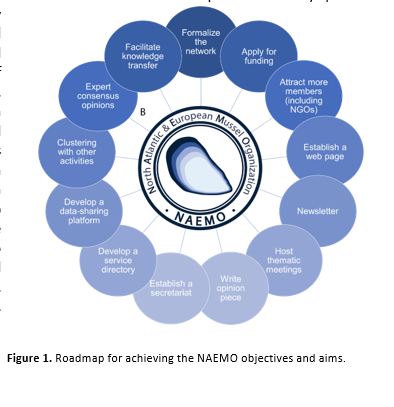NAEMO – NORTH ATLANTIC AND EUROPEAN MUSSEL ORGANISATION
Background
Mussels (Mytilus spp.) are key stone species providing valuable ecosystems services. Over the past years, mussel beds in Europe and North America have been reported to be in regression. Due to the lack of long-term monitoring, especially of unexploited mussel beds, there is no baseline for estimation of the severity of this decrease. Moreover, relatively little is known about potential threats to the welfare of mussels or if these threats are general or vary geographically.
Network objectives and roadmap
We established the North Atlantic and European Mussel Organization (NAEMO) to expand international collaboration between government, academia, industry and NGOs with the aim of providing knowledge-based support for improved management of mussels by increasing our understanding of the global and local processes affecting development of wild mussel populations and their interactions with farmed mussels. Outcomes from the initial workshop identified key questions for the network, specifically (1) evidencing and monitoring mussel bed decline, (2) identification of the causes for such decline, (3) interactions between wild mussel beds and farmed mussel populations and (4) improvements in communication between stakeholders. The roadmap (Figure 1) illustrates the future steps necessary to establish the network and to achieve the objectives, aims and goals of NAEMO. For more information or to join the network, please contact Åsa Strand asa.strand@ivl.se
